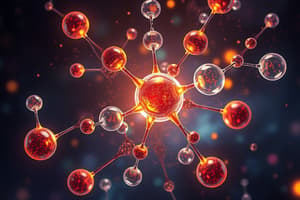Podcast
Questions and Answers
What is the branch of organic chemistry that deals with the structure and bonding of organic molecules?
What is the branch of organic chemistry that deals with the structure and bonding of organic molecules?
- Mechanistic Organic Chemistry
- Physical Organic Chemistry
- Synthetic Organic Chemistry
- Structural Organic Chemistry (correct)
What is a functional group?
What is a functional group?
- A type of reaction condition
- A type of isomerism
- A type of reaction mechanism
- A specific group of atoms within a molecule that determines its chemical properties and reactivity (correct)
What is the purpose of IUPAC nomenclature?
What is the purpose of IUPAC nomenclature?
- To provide a system of rules for naming organic compounds (correct)
- To categorize molecules by their functional groups
- To predict the reaction mechanisms of a molecule
- To describe the physical properties of a molecule
What is an example of structural isomerism?
What is an example of structural isomerism?
What is an example of a substitution reaction?
What is an example of a substitution reaction?
What is the role of a catalyst in a reaction?
What is the role of a catalyst in a reaction?
What is acid-base chemistry the study of?
What is acid-base chemistry the study of?
What is resonance in organic chemistry?
What is resonance in organic chemistry?
Study Notes
Branches of Organic Chemistry
- Structural Organic Chemistry: deals with the structure and bonding of organic molecules
- Physical Organic Chemistry: studies the physical properties and reactions of organic molecules
- Synthetic Organic Chemistry: focuses on the methods and strategies for synthesizing organic compounds
- Mechanistic Organic Chemistry: explores the mechanisms of organic reactions
Functional Groups
- A functional group is a specific group of atoms within a molecule that determines its chemical properties and reactivity
- Common functional groups:
- Alkyl (R-)
- Alkenyl (R-CH=CH-)
- Alkynyl (R-C≡C-)
- Hydroxyl (R-OH)
- Carbonyl (R-CO-R')
- Amino (R-NH2)
- Carboxyl (R-COOH)
IUPAC Nomenclature
- A system of rules for naming organic compounds
- Uses prefixes, suffixes, and root words to describe the structure of a molecule
- Examples:
- Methane (CH4)
- Ethanol (CH3CH2OH)
- But-2-ene (CH3CH=CHCH3)
Isomerism
- Structural Isomerism: different molecules with the same molecular formula
- Stereoisomerism: different molecules with the same molecular formula and bond order, but differing in three-dimensional arrangement
- Enantiomers: non-superimposable mirror images
- Diastereomers: non-superimposable, non-mirror images
Reaction Mechanisms
- Substitution Reactions: replacement of a functional group with another
- Elimination Reactions: removal of a functional group, leading to a new π bond
- Addition Reactions: formation of a new bond between two molecules
- Rearrangement Reactions: reorganization of atoms within a molecule
Reaction Conditions
- Temperature: affects the rate and outcome of a reaction
- Solvents: influence the reaction rate and selectivity
- Catalysts: speed up reactions without being consumed
- Reagent: a substance that participates in a reaction
Important Concepts
- Acid-Base Chemistry: the study of proton transfer reactions
- Redox Reactions: oxidation and reduction reactions
- Stereochemistry: the three-dimensional arrangement of atoms in a molecule
- Resonance: the delocalization of electrons within a molecule
Branches of Organic Chemistry
- Deals with the structure and bonding of organic molecules: Structural Organic Chemistry
- Studies the physical properties and reactions of organic molecules: Physical Organic Chemistry
- Focuses on the methods and strategies for synthesizing organic compounds: Synthetic Organic Chemistry
- Explores the mechanisms of organic reactions: Mechanistic Organic Chemistry
Functional Groups
- A functional group is a specific group of atoms within a molecule that determines its chemical properties and reactivity
- Alkyl (R-) is a common functional group
- Alkenyl (R-CH=CH-) is a common functional group
- Alkynyl (R-C≡C-) is a common functional group
- Hydroxyl (R-OH) is a common functional group
- Carbonyl (R-CO-R') is a common functional group
- Amino (R-NH2) is a common functional group
- Carboxyl (R-COOH) is a common functional group
IUPAC Nomenclature
- IUPAC Nomenclature is a system of rules for naming organic compounds
- Uses prefixes, suffixes, and root words to describe the structure of a molecule
- Example: Methane (CH4) is named using IUPAC Nomenclature
- Example: Ethanol (CH3CH2OH) is named using IUPAC Nomenclature
- Example: But-2-ene (CH3CH=CHCH3) is named using IUPAC Nomenclature
Isomerism
- Structural Isomerism: different molecules with the same molecular formula
- Stereoisomerism: different molecules with the same molecular formula and bond order, but differing in three-dimensional arrangement
- Enantiomers: non-superimposable mirror images
- Diastereomers: non-superimposable, non-mirror images
Reaction Mechanisms
- Substitution Reactions: replacement of a functional group with another
- Elimination Reactions: removal of a functional group, leading to a new π bond
- Addition Reactions: formation of a new bond between two molecules
- Rearrangement Reactions: reorganization of atoms within a molecule
Reaction Conditions
- Temperature affects the rate and outcome of a reaction
- Solvents influence the reaction rate and selectivity
- Catalysts speed up reactions without being consumed
- Reagent: a substance that participates in a reaction
Important Concepts
- Acid-Base Chemistry: the study of proton transfer reactions
- Redox Reactions: oxidation and reduction reactions
- Stereochemistry: the three-dimensional arrangement of atoms in a molecule
- Resonance: the delocalization of electrons within a molecule
Studying That Suits You
Use AI to generate personalized quizzes and flashcards to suit your learning preferences.
Description
Explore the different branches of organic chemistry, including structural, physical, synthetic, and mechanistic organic chemistry. Learn about functional groups and their role in organic molecules.




